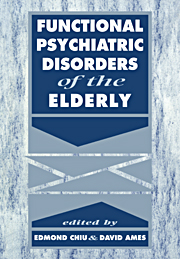Book contents
- Frontmatter
- Contents
- List of contributors
- Preface
- Introduction – A personal note
- Acknowledgement
- Part 1 Classification
- Part 2 General epidemiology
- Part 3 Neuroses
- Part 4 Affective disorders
- Part 5 Psychosexual disorders
- Part 6 Substance use and abuse
- Part 7 Schizophrenia and related psychoses
- Part 8 Psychological, biological and medical issues
- 20 A developmental psychology of old age
- 21 The biology of functional psychiatric disorders
- 22 Brain imaging in functional psychiatric disorders of the elderly
- 23 Medical co-morbidity: presentation in a general hospital setting
- 24 Psychiatric aspects of cerebro-vascular disease
- Part 9 Treatment methods
- Part 10 Conclusion
- Index
23 - Medical co-morbidity: presentation in a general hospital setting
from Part 8 - Psychological, biological and medical issues
Published online by Cambridge University Press: 13 November 2009
- Frontmatter
- Contents
- List of contributors
- Preface
- Introduction – A personal note
- Acknowledgement
- Part 1 Classification
- Part 2 General epidemiology
- Part 3 Neuroses
- Part 4 Affective disorders
- Part 5 Psychosexual disorders
- Part 6 Substance use and abuse
- Part 7 Schizophrenia and related psychoses
- Part 8 Psychological, biological and medical issues
- 20 A developmental psychology of old age
- 21 The biology of functional psychiatric disorders
- 22 Brain imaging in functional psychiatric disorders of the elderly
- 23 Medical co-morbidity: presentation in a general hospital setting
- 24 Psychiatric aspects of cerebro-vascular disease
- Part 9 Treatment methods
- Part 10 Conclusion
- Index
Summary
Introduction
Improved public health and a lower birthrate (because of contraception and abortion) mean that the world is ageing. Although the nations with the oldest populations are also, at present, the most developed, the rate of ageing is most striking in the less developed countries. The prosperity of Japan, together with a distinctive diet and a free health service for old people, has been reflected in an astonishing increase in the number of those old people and the highest life expectancy in the world; this is both good news and bad (Okamoto, 1992), in that there is a major problem of where and how to place those old people who are in hospital because of infirmity.
In Britain, which shares with North-Western Europe the distinction of having the highest proportion of old people in the world, the process has been more gradual. In 1901 5% were aged 65 or more, in 1991 15%. In response to the kind of difficulties now reported by the Japanese, the last 30 years have seen the appointment of ever-increasing numbers of old age psychiatrists, from about three in 1966 to well over 300 at the time of writing (Royal Colleges of Physicians & Psychiatrists, 1989). The College and the Department of Health finally recognized old age psychiatry as a full specialty in 1990.
Although originally based in large psychiatric hospitals, more and more of these psychiatrists have moved into departments within general hospitals.
- Type
- Chapter
- Information
- Functional Psychiatric Disorders of the Elderly , pp. 389 - 406Publisher: Cambridge University PressPrint publication year: 1994



